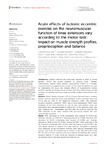Acute effects of isotonic eccentric exercise on the neuromuscular function of knee extensors vary according to the motor task: impact on muscle strength profiles, proprioception and balance

Use this link to cite
http://hdl.handle.net/2183/37897Collections
- Investigación (CCDEF) [298]
Metadata
Show full item recordTitle
Acute effects of isotonic eccentric exercise on the neuromuscular function of knee extensors vary according to the motor task: impact on muscle strength profiles, proprioception and balanceAuthor(s)
Date
2023-11-03Citation
Vila-Chã, C., Bovolini, A., Francisco, C., Costa-Brito, A. R., Vaz, C., Rua-Alonso, M., de Paz, J. A., Vieira, T., & Mendonca, G. V. (2023). Acute effects of isotonic eccentric exercise on the neuromuscular function of knee extensors vary according to the motor task: impact on muscle strength profiles, proprioception and balance. Frontiers in Sports and Active Living, 5. https://doi.org/10.3389/FSPOR.2023.1273152
Abstract
[Abstract]: Introduction: Eccentric exercise has often been reported to result in muscle damage, limiting the muscle potential to produce force. However, understanding whether these adverse consequences extend to a broader, functional level is of apparently less concern. In this study, we address this issue by investigating the acute and delayed effects of supramaximal isotonic eccentric exercise on neuromuscular function and motor performance of knee extensors during tasks involving a range of strength profiles, proprioception, and balance. Methods: Fifteen healthy volunteers (23.2±2.9 years old) performed a unilateral isotonic eccentric exercise of the knee extensors of their dominant lower limb (4 ×10 reps at 120% of one Repetition Maximum (1RM)). The maximum voluntary isometric contraction (MVC), rate of force development (RFD), force steadiness of the knee extensors, as well as knee joint position sense and mediolateral (MLI) and anteroposterior stability (API) of the dominant lower limb, were measured pre-, immediately, and 24 h after the eccentric exercise. The EMG amplitude of the vastus medialis (VM) and biceps femoris (BF) were concomitantly evaluated. Results: MVC decreased by 17.9% immediately after exercise (P<0.001) and remained reduced by 13.6% 24 h following exercise (P<0.001). Maximum RFD decreased by 20.4% immediately after exercise (P<0.001) and remained reduced by 15.5% at 24 h (P<0.001). During the MVC, EMG amplitude of the VM increased immediately after exercise while decreasing during the RFD task. Both values returned to baseline 24 h after exercise. Compared to baseline, force steadiness during submaximal isometric tasks reduced immediately after exercise, and it was accompanied by an increase in the EMG amplitude of the VM. MLI and knee joint position sense were impaired immediately after isotonic eccentric exercise (P<0.05). While MLI returned to baseline values 24 h later, the absolute error in the knee repositioning task did not. Discussion: Impairments in force production tasks, particularly during fast contractions and in the knee joint position sense, persisted 24 h after maximal isotonic eccentric training, revealing that neuromuscular functional outputs were affected by muscle fatigue and muscle damage. Conversely, force fluctuation and stability during the balance tasks were only affected by muscle fatigue since fully recovered was observed 24 h following isotonic eccentric exercise.
Keywords
Eccentric exercise
Isotonic load
Rate of force development
Force steadiness
Joint position sense
Postural control
Isotonic load
Rate of force development
Force steadiness
Joint position sense
Postural control
Editor version
Rights
Atribución 4.0 España
ISSN
2624-9367






